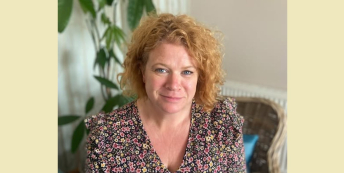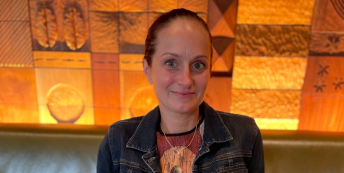“I couldn’t stand not being myself anymore.”
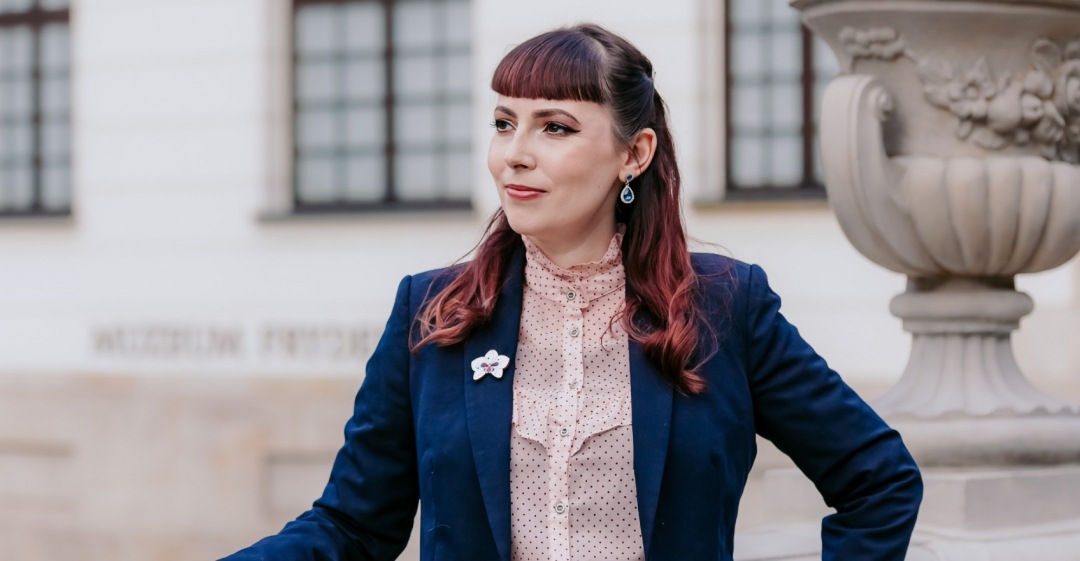
Newly Updated
What work were you doing previously?
I’d been working in the private sector in corporate PR for just under two years.
Prior to that, my experience had been in the public sector, initially as a project manager in French public administration, then working for seven years at the French Embassy in Poland.
I was respectively in charge of cultural, university and scientific cooperation between French and Polish institutions.
What are you doing now?
I'm the head of a French-Polish communications agency (ID DROP).
We provide companies and public organizations with a comprehensive range of services in strategy, communications/PR, graphic design, and digital marketing.
How did you feel in your work before you decided to make the change?
I truly loved the missions I had at the Embassy.
The projects we created and then carried out with our Polish and French partners were very exciting and really had an impact on the youth, arts, and future of research and development in Europe.
It was also an honour for me to contribute to the strengthening of political ties between France and Poland. I learned a lot about Poland and Polish people when I was working at the Embassy.
I don't regret this experience at all.
Why did you change? And when was the moment you decided to make the change?
After seven years in the same role, I felt the need to learn new skills and to challenge myself.
It wasn’t possible for me at my previous job to evolve while staying in Poland.
I was also curious about the private sector, so I joined a big French corporation for a bit less than two years. Again, I decided to leave before renewing my contract because I felt that I was not going forward as much as I wanted to.
The management at this company left no space for personal initiatives and ideas. I felt that my creativity was fading away and I couldn’t stand not being myself anymore.
It took me six months after this uncomfortable experience to gain faith again in my own abilities. I wouldn't have made it without the support of my closest friends and husband.
How did you choose your new career?
Communications and PR were always an important aspect of my job, and may be one of my favorites.
It's a field that requires analytics, creativity, empathy, boldness, and very good writing and oral skills. You have to talk with people, understand them, and create something with and for them.
Having the possibility to learn many things at once and to tackle many subjects at the same time was always very rewarding for me.
Marketing and communications in general was a good choice for me from that perspective.
Are you happy with the change?
Let's be honest, being your own boss is not easy.
I struggled for two years to find a good balance between my work and private life in order to protect myself and my health. My company is very important to me, I have put 300% of my commitment into it, and it's hard sometimes to let it go.
I'm still learning though and don't work on weekends anymore.
But I don't regret my choice. Creating my company taught me so much! I learned more in four years than I've ever learnt in my previous roles, both on the professional and personal levels.
What do you miss and what don't you miss?
Sometimes I miss having a strict work schedule, as I often have to make myself available both for my clients and my team.
I also miss having a manager above me, that could cheer me up or support me in difficult times, though I know that both of these things are pretty idealistic.
On the other hand, I don't miss being part of a rigid management structure. If I want to learn something new, I do it. If I want to work on a new project, I do it, and that is all.
Nobody can prevent me from growing at my own pace anymore.
How did you go about making the shift?
I left my previous job and started working on my business model and concept.
I reflected upon my own skills and previous experiences and figured out a way to make them useful for others. I identified my potential clients and started to work on my personal branding.
At first, I was doing everything alone. Quickly, and with the arrival of new clients, I built up a team and invested in new skills.
How did you develop (or transfer) the skills you needed for your new role?
I read. A lot!
As soon as I left my job in the private sector, I ordered a few books from bestselling marketing and PR experts. I made notes, subscribed to a few magazines and portals, and also signed up for expert meetings in Warsaw.
This really helped me to better understand the market and the new trends in my field.
It also allowed me to broaden my vision of communications far beyond my work experiences alone.
How did you handle your finances to make your shift possible?
I feel very lucky because I didn't have to take on any loan for creating my company.
I decided to grow step by step, slowly, but surely.
My husband also helped me cover our living expenditure for a few months before signing my first contract.
What was the most difficult thing about changing?
To truly believe in myself.
After leaving the private sector, I felt very down because I'd accepted a role that didn't suit me at all, and it left some marks in my mind.
I even started doubting the skills I earned previously and was far from being confident in starting something alone from zero. My closest friends and husband helped me gain faith again.
Focusing on the learning process and not on the final goal also helped me stay focused and motivated.
Not many women below 35 years old decide to launch their own business, and earning trust and credibility among potential clients was also a real challenge, especially when you are dealing most of the time with men over 50.
What help did you get? 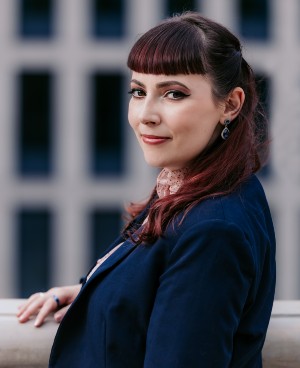
Apart from the support of my closest friends and husband, nothing.
I owe the success of my communications agency only to myself and to my team.
What have you learnt in the process?
I've learnt a lot about myself, my needs and my aspirations in life.
Also, when looking at the point that I've reached today, I can clearly say that if you want something dearly, you can make it happen.
I think I needed this unfortunate experience in the private sector to give me the little push I was craving for a long time. We don't learn only from good experiences, but mostly from bad experiences.
In my case, it opened up a whole new path in my life.
What would you advise others to do in the same situation?
Don't stay at a job where you don't feel like yourself, and don't expect others to come to your rescue.
I know some of you might have some financial difficulties, but really, the more you wait, the more time it will take for you to build your confidence back.
Also, don't ignore the little voice which is trying to show you what you need in life. Believe me, listen to it. It works wonders.
We caught up with Cyrielle recently to see how her shift was working out, roughly two years on. Here's what she's been up to, and the biggest lessons she's learned.
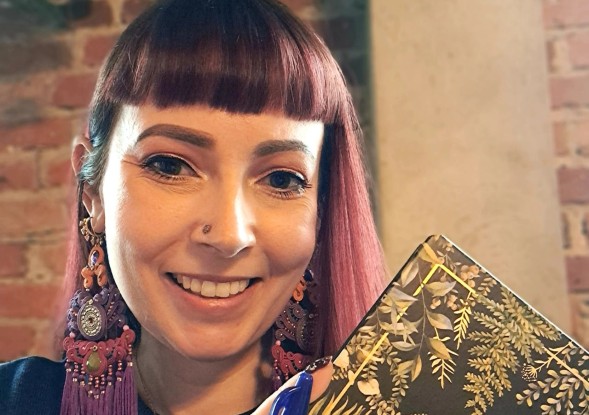
What's changed for you in your career since we first published your story?
I expanded my team from two to five people working full time in our agency, and we also work with five freelancers on a regular basis.
I had to quickly learn new management skills and get in the habit of delegating as much as possible, in order to be able to focus only on the strategic aspects of projects and on the development of my business.
It wasn’t an easy task at first, because I’m very demanding and sometimes it seemed to me easier to do the thing myself (because it would take less time), than training someone from 0 and correcting the work X times before sending it to our client for validation.
But in the long term, it’s really something that pays off, as I see my team gaining new skills and being more and more autonomous.
It’s very rewarding to see them grow and to know that I can now rely on talented and committed people.
It was also quite challenging for me to find myself in this new role, as I’m still concerned about being a good boss and leader, but I also have to be honest and straightforward when something is wrong.
I also suffered from a burn out last autumn that forced me to review my approach to work, and the way I organize tasks and priorities in my team.
I’m still recovering from it.
How do you feel about your work now?
I won’t lie here: the past two years were very challenging.
And even though we increased our portfolio of clients, we had many unpleasant situations with both employees and clients, mainly because I failed to set clear boundaries at the beginning.
I wasn’t openly saying when something was wrong and following my gut.
I’m now more relaxed and hopeful about my business, as we finally managed to have a core good team, but I have to be conscious about my limits.
I love my work, and I’m very proud of all we accomplished together with my team, but it can’t happen at the cost of my health.
What challenges have you come up against since making your shift, and how exactly have you dealt with them?
I’ve learned a lot since I opened my business almost six years ago, more than in any other job positions.
I have to adapt constantly, to my employees, to clients, to the market... Also, marketing is a field
in which you have to update your skills and knowledge at least a few times per year because the industry is always bringing up new functionalities, tools and trends.
I love learning new things, so this isn’t a problem for me, but I regret not having as much time for it as I’d like to, because apart from being an agency director, I’m also a team lead, project manager and strategist.
What helped me a lot was to conclude partnership with another company, so I could benefit from their HR services for finding new people and we also exchange ideas on a lot of things.
I know I’m not alone in this anymore and it really helps.
As our team grew quite fast, we’re now working on setting up clear processes and methodologies, so that onboarding new people can become easier.
For clients, we’ve also established clear plans and cooperation conditions based on our six-year experience, so we can now avoid any misunderstanding.
Step by step, things are becoming more clear. But the hardest part for me was to accept that you need time to see things and make them better.
It’s like building a house, brick by brick.
How is the financial side of things panning out, and is this what you'd expected?
We’ve tripled our number of clients, and we now have a good base of long-term clients, but some months are still harder than others.
Our goal this year is to stabilize everything; the finances, the team, the processes. Then we can grow with strong foundations.
Only now I have an acceptable salary, still far from the market average for my position though...
What have you learned, since making your shift?
That the most important thing in business is believing in yourself.
If you're confident about your skills and what you can change/bring to others, others will follow you.
I also learned that I don’t need to wear a mask or try to be someone else to attract the right people. It’s actually the contrary.
When I started being more authentic and true to myself, I was finally attracting employees and clients who align with my values.
Is there anything else you'd like to share?
Yes, I’d like to add that mental health should be considered a priority when you start and manage a business.
We always talk about training, mindset, networking, sales, personal branding and so on, but very rarely about the fact that work shouldn’t absorb your whole life and have a negative impact on your mental health.
As a business owner, I believed I should be available 24/7 for any potential client, or that I should work up to 15 hours a day and it destroyed me. I almost closed down my business for that reason.
The truth is your business wouldn’t exist without you, so YOU are the most important part of your business. So take care of yourself!
To find out more about Cyrielle's business, visit www.iddrop.eu
What lessons could you take from Cyrielle's story to use in your own career change? Let us know in the comments below.

